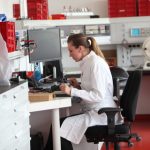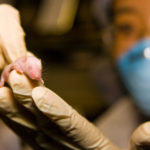
University of Liverpool and Crypalis to develop acute pancreatitis drug
A partnership between the University of Liverpool and Cypralis has been granted a new Early Stage Award worth £300,000 to develop new compounds to treat acute pancreatitis (University of Liverpool, 2017). Acute pancreatitis is an extremely painful disease that is most often associated with gallstones, excessive alcohol intake and obesity and is currently treated in … Continue reading University of Liverpool and Crypalis to develop acute pancreatitis drug

New research helps to make the most of nanoscale catalytic effects for nanotechnology
Research by scientists at Swansea University is helping to meet the challenge of incorporating nanoscale structures into future semiconductor devices that will create new technologies and impact on all aspects of everyday life (Swansea University, 2017). Dr Alex Lord and Professor Steve Wilks from Swansea University’s Centre for Nanohealth led the collaborative research, the findings … Continue reading New research helps to make the most of nanoscale catalytic effects for nanotechnology

Blood test can predict life or death outcome for patients with Ebola virus
Scientists have identified a molecular barcode in the blood of patients with the Ebola virus that can predict whether they are likely to survive or die (University of Liverpool, 2017). A team at the University of Liverpool, in collaboration with Public Health England, Boston University and other international partners, used blood samples taken from infected … Continue reading Blood test can predict life or death outcome for patients with Ebola virus

Antibody can protect brains from the ageing effects of old blood
Old blood may have a powerful effect in terms of damaging organs and contributing to ageing, but a compound has been developed that seems to protect against this, preventing mice’s brains from ageing (New Scientist, 2017). The effects of blood on ageing were first discovered in experiments that stitched young and old mice together so … Continue reading Antibody can protect brains from the ageing effects of old blood

Centre of Excellence in Infectious Disease Research launched
The University of Liverpool and Liverpool School of Tropical Medicine (LSTM) have launched a new joint centre which aims to address the urgent need to develop new antimicrobials and accelerate solutions for existing and emerging infections (University of Liverpool, 2017). Translating research from across these two institutions, the Centre of Excellence in Infectious Diseases Research … Continue reading Centre of Excellence in Infectious Disease Research launched

Eating disorders are affecting more UK women in their 40s and 50s than expected, finds new sudy
In a UK study of 5,320 women, 3% were found to have an active eating disorder in mid-life, a figure higher than expected as eating disorders are primarily associated with adolescence or early adulthood (University of Bristol, 2017). The research, using data from the University of Bristol’s Avon Longitudinal Study of Parents and Children cohort, … Continue reading Eating disorders are affecting more UK women in their 40s and 50s than expected, finds new sudy

£1.5m boost for cancer research in Liverpool
Liverpool scientists and doctors are set to receive a major cash boost for research into cancer (University of Liverpool, 2017). Cancer Research UK and NIHR plan to invest nearly £1.5m over the next five years in ground-breaking work at the Liverpool Experimental Cancer Medicine Centre (ECMC). The ECMC is a collaboration between researchers at the … Continue reading £1.5m boost for cancer research in Liverpool

New understanding of AIDs-related dementia
Researchers from Cardiff University and UCLA have made a breakthrough in the understanding of AIDS-related dementia, discovering the role of a neuron protein which was also found to affect learning abilities in healthy subjects (Cardiff University, 2017). Professor Kevin Fox, who led the work at Cardiff University’s School of Biosciences, said “Our work represents a … Continue reading New understanding of AIDs-related dementia

Wearable technology can tell when you’re going to get ill
A new study has found that wearable technology can be used to tell if someone is falling ill (New Scientist, 2017). Stanford University geneticist Michael Snyder wore eight fitness tracking devices every day for two years to see if there were any differences between them (Scientific American, 2017). He and several colleagues also put the … Continue reading Wearable technology can tell when you’re going to get ill

Statins may reduce the risk of blood clots in the vein
A study published by Dr Setor Kunutsor of the Musculoskeletal Research Unit in the University of Bristol’s School of Clinical Sciences, with colleagues from the University of Leicester, has confirmed that statins could play an important role in reducing the risk of venous thromboembolism (University of Bristol, 2017). Statins are groups of medications that reduce … Continue reading Statins may reduce the risk of blood clots in the vein








